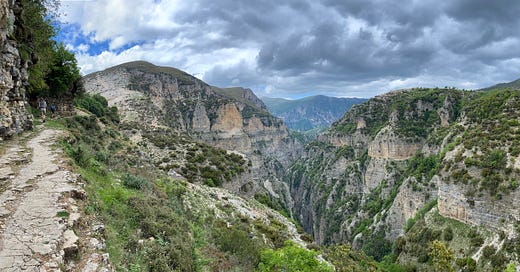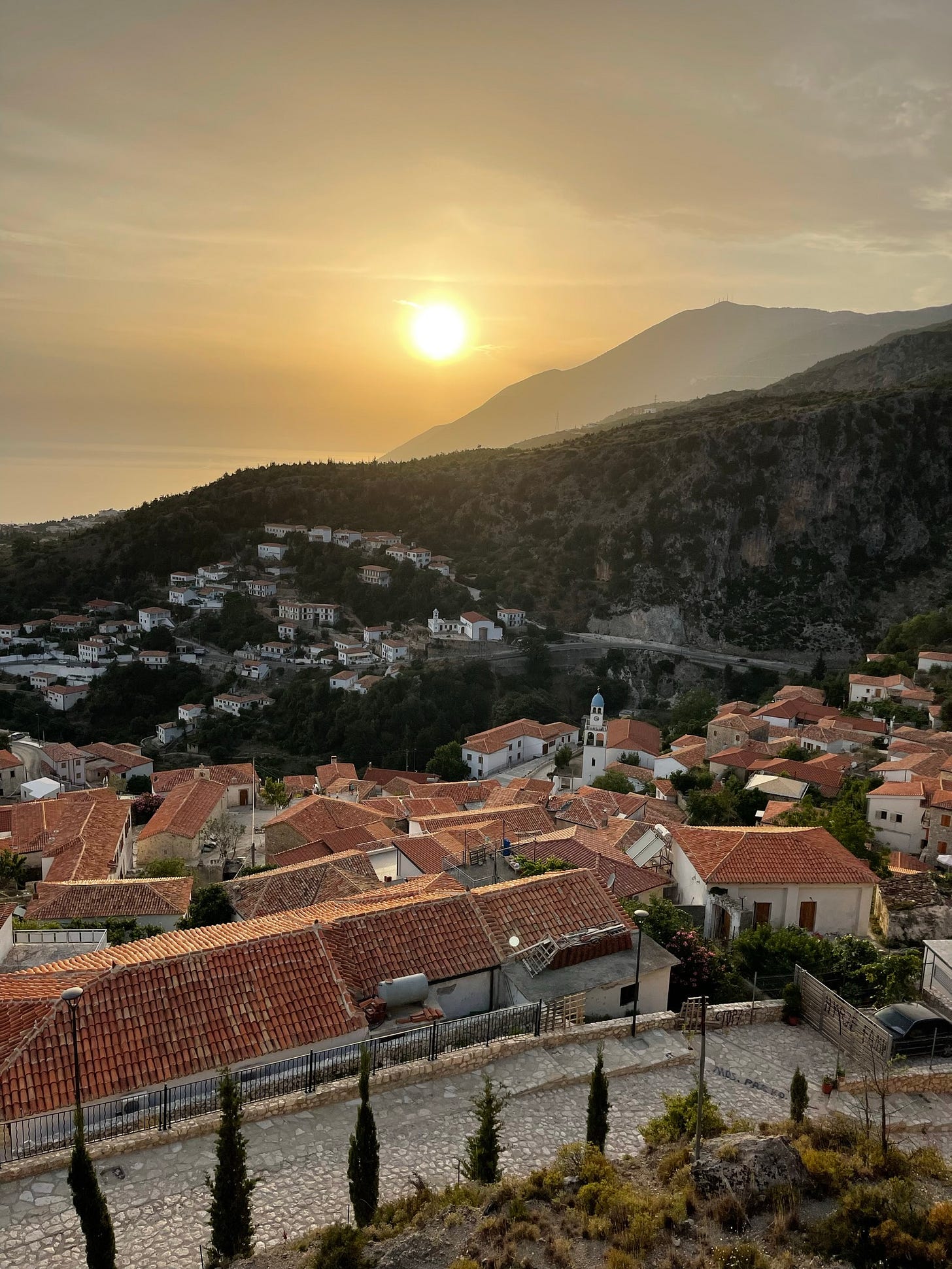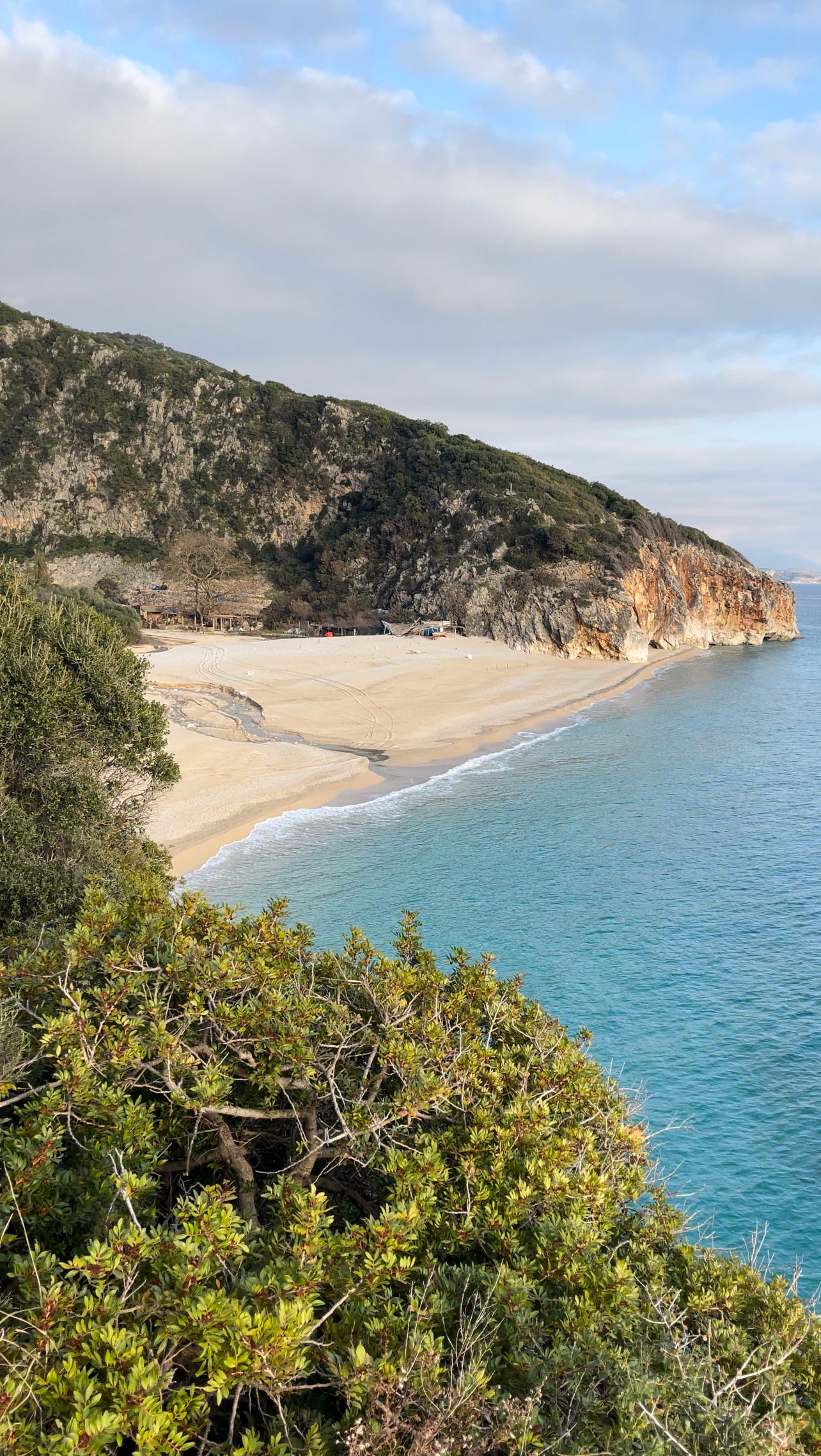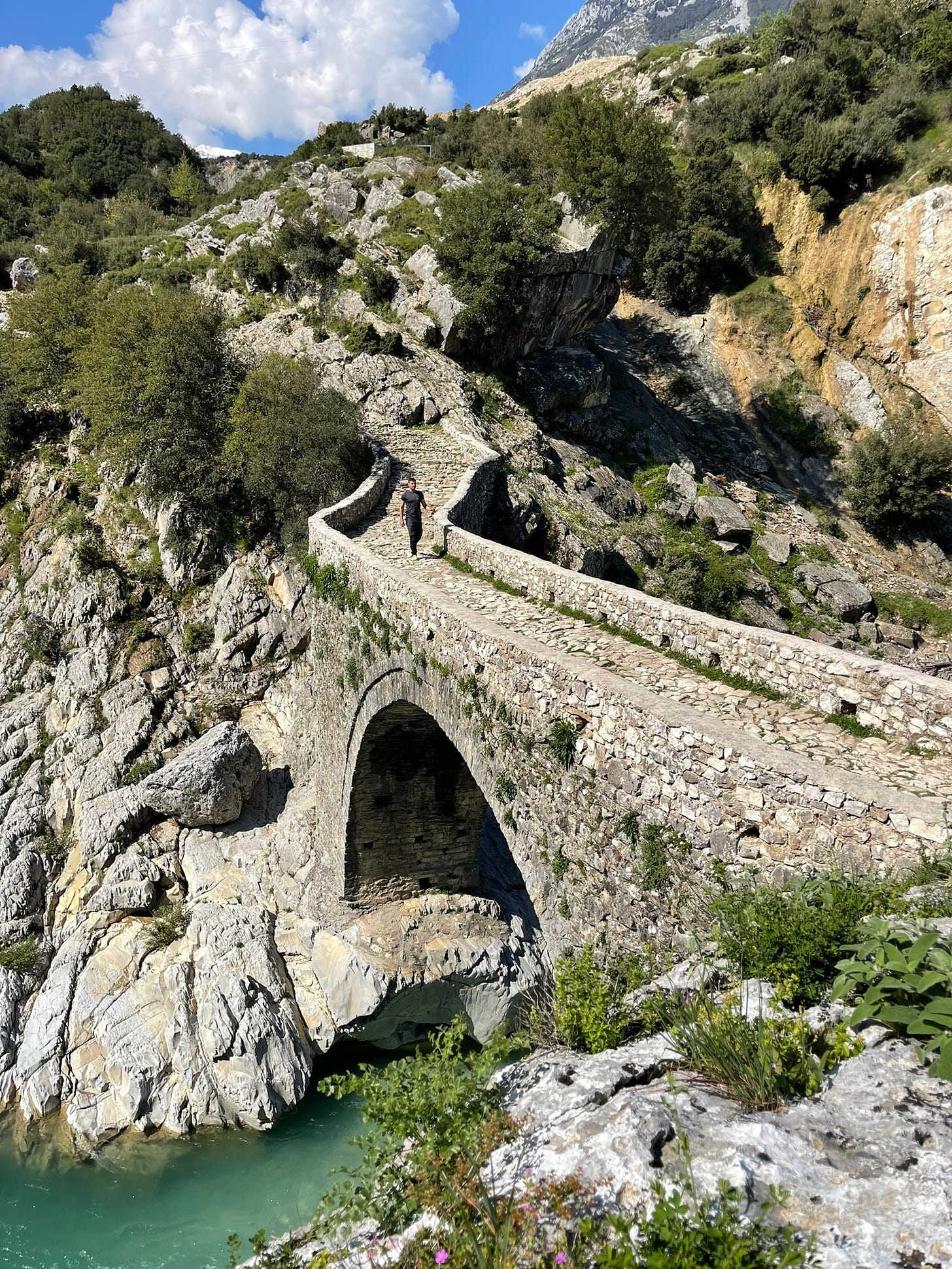What I Love About Albania: An Introduction
A 2,000 word primer on what foreigners need to know about Albania
Americans always ask me: what do you like about Albania?
What I love about Albania is that the food is delicious. I love walking into random byrektores, each one run by a different yet somehow identical smiling, crinkly-eyed, hairnet-adorned old lady with wrinkles across her forehead. You can order spinach, cheese, meat or tomato-filled puff pastries. And every single time they are mouth-wateringly good.
Some are sweet and some are salty. The best are doughy. And you can eat as many as you want without gaining a lot of weight.
(I think.)
What I love about Albania is that people are very friendly here. When you tell them that you’re American, their eyes light up with a small spark of delight and they want to know everything about you. The villager wants to take you by hand into his humble home and offer you walnuts and cherries from his orchard. The city-dweller wants to know which state you hail from, because he has a cousin in Michigan or New York or Florida.
They are curious to know why you’re in Albania. They are curious why you came here when they’ve all left to go THERE, America, land of opportunity. Why would you walk back into the past to live here?
The most endearing thing a foreigner can do is learn Albanian. Even the smallest smidgeon of the language makes Albanians fall even more in love with you. Asking an Albanian si je is a good start: how are you? But when they find out you studied Albanian intensively for six months and you can introduce yourself and tell your life story in their language, they positively melt into a puddle of excitement.
You are not obligated to do or be anything here because, as a foreigner, Albanians love you unconditionally and want you to feel at home. Every small, hunchbacked nona on the streetcorner hawking roasted hazelnuts from the mountains of Korca wants to be your best friend and invariably asks you: nga je, where are you from?
Every austere old man on his rusty bike from the Communist era with his wide-brimmed hat and baggy suit and vest and six remaining teeth wants to know why you ended up in this small corner of the Balkans.
Hip college girls with nose piercings and dyed red hair and too much mascara and big, round hips look at you with wide eyes because they’ve only ever spoken English out loud when they rapped along to the 2009 Eminem YouTube music video from which they learned the language.
They all start speaking at a slightly faster clip and ask you what you like about Albania.
What I love about Albania is that the countryside is stunning, beautiful and diverse. You can hike snow-laden Alps and end the same day sunbathing on a stony Mediterranean beach with crystal-clear turquoise waters lapping at your feet. The interior of the country boasts massive vineyards and orchards. The sunset every evening is a dazzling display of oranges and purples and reds melting the illusion of a firmament separating land and earth. The air once you leave Tirana is clean and full of vitality.
What I love about Albania is that it’s a picture book. It’s a fairytale. It’s a Windows 11 screensaver, but in real life. To the north you have Theth, an alpine mountain-ringed valley with an old town boasting a gorgeous stone church and a dazzling one-hundred foot waterfall gurgling nearby. You wake up in the morning in a small wooden cabin where a little old lady who doesn’t speak any English serves you freshly-churned butter, pickled vegetables, half-hour old bread and scrambled eggs. You walk outside and the snowy mountaintops look down at you with an almost haughty majesty, challenging you to scale their rocky cliffs.
I cannot describe the verdancy of the grass fields lining the crystal-clear shores of Lake Ohrid in Pogradec and the way the sunset makes Mali i Thate, the Dry Mountain, opposite the small town, reflect every single shade of purple and indigo. Shades you never even knew existed.
What I love about Albania is that there are no Americans here with their self-consciousness and Protestant work ethic and desire to describe everything with the most politically correct, inoffensive, bland words. You never have to guess with Albanians: they wear their emotions on their sleeves. If they smile or laugh, they genuinely enjoy your presence and want to spend more time with you. When they scowl, you can move on and safely assume you’ve bothered them. They are unafraid to express their emotions and most conversations invariably involve raised voices and laughter.
What I love about Albania is that every situation and occasion has a vivid and hilarious accompanying phrase. There are more idioms than stars dotting the night sky and each one makes you scratch your head in confusion until a native explains it to you.
Some are stomach-churning and graphic: burre e grua – mish e thua, a man and his woman, like flesh and a nail
Some reflect the country’s traditional views on child-rearing and family life: kush te rreh, to do. He who strikes you, loves you
And some just make you frown with bewilderment. Nuk bie rrufeja ne hale: lightning doesn’t strike inside the outhouse. It’s a snarky way of saying that you’re such a nobody, that the chances of something happening to you are close to zero
What I love about Albania is that life is slow. People here work to live, and that means not working a moment longer than necessary, because there is too much joy to be had in the small pleasantries of life. Nobody is rushing to the office; that can wait. Nobody works in August, because in August, Tirana turns into a giant humidifier with temperatures above one hundred degrees Fahrenheit and the city spits out all its inhabitants onto the glistening shores of the southern beaches.
What I love about Albania is the other foreigners you meet living or traveling through here.
There’s always a good chance you’ll run into some badly-sunburned Germans, because the Germans tend to get everywhere
You’ll meet Italians because their country occupied Albania for a decade and it’s a forty-five minute flight from Rome and it’s cheap and everyone in Tirana above the age of thirty speaks their language fluently
You’ll meet Egyptians because it’s the only European country that has waived visa requirements for the sand-swept home of the pyramids
You’ll meet a sprinkling of Americans who are into bitcoin, libertarianism and hiding their data from the government (hello, Proton mail)
You’ll meet Chinese dissidents escaping their dystopian surveillance state and Turks who think they are in Paris when, in reality, they’re just strutting the streets of Blloku
Nobody wants to have anything to do with their home country, and yet, they bring it along with them. In this fashion Albania continues its tradition of mixing every single culture to have traversed its mountains and landed on its beaches into a delicious, messy fusion.
What I love about Albania is that it’s a beautiful mixture of old and new. A small country stampeding blindly into the future even though most of its population belongs to the past. Parents still think their children must marry an Albanian. Their children want nothing more than to immigrate to the UK or the US or Germany and become citizens of the West.
Everyone walks the streets happy and unperturbed by the cognitive dissonance of being an Albanian in the twenty-first century.
Yet, if you dig a little bit underneath the surface, you’ll discover that people are invariably grappling with the tension of being caught in this moment-between-moments, this march towards a brave new cosmopolitan world even as the traditions of the past inform their every single movement.
One person I met this past year is a perfect example: a young gay man from a town in the north who came to Tirana to make a living and create a little bit of space between himself and his family, which is unaware of his sexuality. The young man was struggling to find his place in the country’s capital city.
On the one hand he wanted to be near friends who had attended university (he had not). Nightlife in Tirana is vibrant and he would tell me every day of the previous night’s escapades. The dating pool is large and, as opposed to his small, sleepy town, maintaining some sense of anonymity in the socially conservative country would be much easier in its capital.
Yet he told me he’d take the day off from work for Bajram, the end of Ramadan, because “everyone is going to be there” and he could not miss the break-fast meal back home. When his aunt was discharged from her surgery at the hospital, he also asked to take time off to go pick her up, because in Albania, family comes first.
There’s no end to the contradictions people straddle in Albania: gay and religious. Internationally-bound yet homesick. Multilingual, but caged by a weak passport.
What I love about Albania is that it’s one of those few European countries where people generally like the US. Everyone loves that America came to Kosovo’s aid during its war with the Yugoslav forces, driving the Serbs and Montenegrins out and saving its Albanian population from death.
What I love about Albania is that it is so small and so unknown and every time I go back to the US, Americans spout mistakes that I get to correct, because, now, I am a world traveler who can:
No, Albanians are not Slavic - the thought of someone saying such a thing to any of my friends makes me gag!
No, I do not live in Eastern Europe - yet another American faux paus that would make an Albanian cringe
Yes, I am completely safe and will not be affected by the war in Ukraine, which is being waged at least three hours of flying away from where I live
What I love about Albania is that it has accepted me with arms wide open and nobody bats an eyelid at my story. Nobody asks me why I want to live in this tiny slice of the Ballkans. Maybe they understand. Maybe they don’t. Maybe they don’t even know what they don’t understand, but, at the end of the day, they smile and wish me miresevini, welcome.
What I love the most about Albania is that nobody is particularly perturbed by anything that happens in the country, probably because they know their ability to change anything is limited. Politics is intense, tribal and immensely frustrating due to the high level of corruption; yet, at the same time, it’s all quite impersonal.
International news barely makes any impression on Albanians. They know that nobody really cares too deeply about their small country and they do not care to be cared about, either. They know there is still work to be done before Albania can be cared about in any significant way.
The best thing about Albania is the food.
The best thing about Albania is the nature.
The best thing about Albania is not being from here.
The best thing about Albania is that it just barely knows you, but it wants to be known, so very badly. And maybe in getting to know this tiny, forgotten country, you get to know yourself just a little bit better.








Great job! 👏 I could hear your voice as I read it. Fave part: “Nobody works in August, because in August, Tirana turns into a giant humidifier with temperatures above one hundred degrees Fahrenheit and the city spits out all its inhabitants onto the glistening shores of the southern beaches.” So vivid. Love it. ❤️
Top drawer.